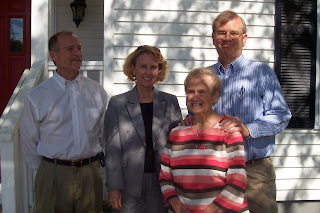“Water, water everywhere” is a familiar line from “The Rime of the Ancient Mariner.” I wonder how many of you have been thinking “water, water, everywhere” this morning. You entered the sanctuary and saw the baptismal font front and center. You heard water phrases—waters of our baptisms, sprinkled clean, washed pure. You watched and listened as the children and I talked about water, touched the water in the pitcher and poured water into the font. The scriptures today—both the Call to Worship and the text Ken just read, evoke water images—springs of water, pools of water, the Jordan River overflowing its banks, a heap of water. “Water, water, everywhere”
Water is everywhere—life-giving, cleansing, saving water. Water covers over 70% of the earth and makes up 60% of the human body. Water is everywhere—life-giving, cleansing, saving water is recorded throughout the Bible. In the 1st creation account in Genesis—in the beginning, God’s spirit moves over the face of the waters creating all that there is. Later in Genesis God cleanses creation of human wickedness in the flood waters that cover the earth, the flood waters that Noah and his family ride out in safety in the ark accompanied by a pair of each species of animals. In the exodus, God parts the waters of the Red Sea long enough for the Hebrews to cross over safely before allowing those same waters to drown the Egyptian army. In the gospel accounts, John the Baptist, the voice in the wilderness, calls people to repent and be baptized—with water. Water, water everywhere—life-giving, cleansing, saving water.
Appearing in the biblical record, water is often connected with identity. It is when they pass through the parted waters of the Red Sea that the fleeing Hebrews become free. Their identity changes—from Pharaoh’s slaves to God’s treasured people. It is here, in today’s text when they pass through the parted waters of the Jordan River, that they claim their identity as Abraham’s heirs. Crossing the Jordan, they finally arrive in and lay claim to the land God promised Abraham a thousand years before.
And a thousand years after the events of today’s text, a thousand years after the Israelites cross the Jordan, John the Baptist baptizes Jesus in this very river. As Jesus emerges from the waters of the Jordan River, the Holy Spirit descends on him and a voice from heaven claims he is “God’s son, the beloved, with whom God is well-pleased” (Matthew 3: 17 Mark 1:11, Luke 3:22) According to the gospel accounts, it is in the waters of his baptism, that Jesus is identified as the Messiah, as the Christ.
It is in the waters of our baptism that we receive our identity—God’s beloved child,
adopted into the family of God, made heirs to God’s covenant promises through Christ, our savior, and our brother.
We call baptism a sacrament. It is one of the 2 sacraments we Presbyterians celebrate—the other being The Lord’s Supper. A sacrament is a visible sign of an invisible grace conferred by God. That means, in the sacraments, God is the one who acts; God is the one who does something. We are the recipients; we don’t do anything but accept God’s grace. In baptism, water is the visible sign. Through the power of the Holy Spirit, we experience the baptismal water as life-giving, cleansing, and saving. Dying to our old life, we rise from the waters of our baptism as a new creation—ready to live a new life. The invisible grace in the sacrament of baptism is God’s claim on us—You are my beloved child, and I am your loving parent God.
We Presbyterians celebrate the sacraments not privately, but corporately. So, this identity that we receive in our baptism, is a communal identity as well as an individual identity. We are baptized into the family of God. When a child is baptized, we—the members of the church—promise to love, nurture, and guide that child in our faith. It takes a family—the church family—to raise a child in the faith. When an adult is baptized, we—the members of the church—promise to love, nurture, and guide that adult in our faith. It takes a family—the church family—to welcome an adult into the faith. Sometimes, like the prodigal son, we might lose our way. One of us might forget who she is. One of us might forget where he came from. But since our baptism is a communal identity as well as an individual identity, the church, the family of God, will not forget who this lost one is. The church, the family of God, will not forget where he came from. We, the church will always hold a place for her in this family.
We, the church universal—the catholic with a little c church, have a creed we have been saying for almost 2000 years. This creed was first used to teach the faith to those who wanted to become followers of Christ. As the church endured persecution and faced divisions, the creed evolved. We, the church universal, the church in all places and all times—have a creed we say at baptismal rites—the Apostles’ Creed. It states what we believe about God—God the Father, God the Son and God the Holy Spirit. We say it together because at baptism, we receive both an individual and a communal identity.
Connected to believers in all times—from the apostles who witnessed the birth of the church at Pentecost to those who will express our faith in the future—connected to believers in all times and places, we belong to the communion of saints. Saying the Apostles’ Creed when we celebrate baptism, we remember our communal identity and our individual identity.
Water, water, everywhere—life-giving, cleansing, saving water. Baptismal water seals our identity. We are beloved children of God, adopted into the family of God, heirs of God’s covenant promises through Christ, our savior, and our brother. Baptismal water marks us with God’s permanent claim. We belong to God. Thanks be to God!


